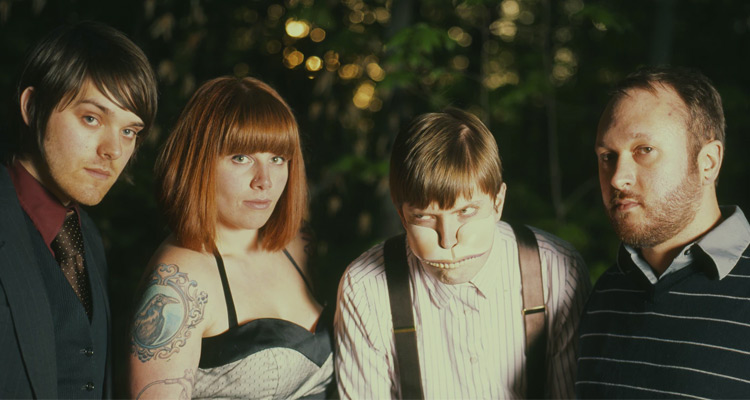In our MKE Music Rewind series, we revisit notable Milwaukee music that was released before Milwaukee Record became a thing in April 2014.
It’s funny how music designed to sound out-of-time can end up perfectly representing the time in which it was made. Take The Scarring Party, Milwaukee’s wickedly morose, gone-but-not-forgotten “end timey” group. Beginning with 2006’s A Concise Introduction and culminating with 2015’s belated (and aptly titled) End Times, the band stubbornly refused to sound anything like a modern concern. Instead, it combined vaudeville-esque vocals, kitchen-sink instrumentation, and a flair for the macabre to create a sound better suited to a messed-up Max Fleischer cartoon than an in-studio YouTube video.
And yet when I revisit The Scarring Party today—specifically the group’s excellent 2010 LP Losing Teeth—I can’t help but be taken back to the late-’00s and early-’10s. I remembering The Scarring Party being everywhere back then, and even though I was initially slow to warm to the band’s particular vibe, I eventually became hooked.
Looking to be (re-)hooked yourself? Here’s a Bandcamp embed of Losing Teeth, followed by my original review for A.V. Club Milwaukee. Nine years later (!), I stand by my words.
The title of The Scarring Party’s third full-length album, Losing Teeth, brings to mind any number of dour images. Of course, death has always been one of the Milwaukee band’s main concerns. Since its 2006 debut, A Concise Introduction, the “end timey” quartet has carved out a musical niche positioned somewhere between an Edward Gorey frontispiece and a Henry Darger fever dream. But Losing Teeth conjures up even more primal anxieties: of our most basic means of survival and self-defense falling out or crumbling away.
It’s this tether to such primitive nightmare stuff that gives the 12 tales of the macabre on Losing Teeth an unexpected weight and resonance. Once again subscribing to a dark, 1920s vaudeville aesthetic built on menacing tubas, droning accordions, and carnival barker vocals, The Scarring Party doesn’t so much reinvent itself as crystallize its M.O. Lead singer and songwriter Daniel Bullock’s tales of despair are sharper—and funnier—than ever before. Buoyed by stellar ensemble work from band members Isabella Carini, Christopher Roberts, and William Smith, Bullock’s character sketches linger in the mind long after their subjects meet their twisted fates.
But don’t let the doom and gloom fool you: Bullock is first and foremost a wicked, hilariously perverse storyteller. “How Far Down Does This Hole Go” details not only a mother’s guilt after losing her child down a bathtub drain, but a rather effective form of revenge after a “family friend” makes a sinister advance on the young narrator. One of the album’s strongest tracks, “Raymond Dogboy,” spins an uproarious tale of a hapless sideshow freak who survives numerous attempts on his life—at the hands of his family members, no less—before finding an unlikely life calling. More often than not, the group’s songs contain twists so unexpected and satisfying that any discussion of them should come complete with spoiler warnings.
Granted, listeners unwilling to buy into The Scarring Party’s music-hall-from-hell act are once again in for a bumpy ride. The group’s staunch refusal to break character continues to be a little frustrating; only during the unexpectedly lovely “Angela” does Bullock’s voice briefly shed its affected warble. Still, it’s hard to fault the group for sticking to its guns, especially when songs like “Lie Beside Me Darling, Underneath My Stone” and “Last Night At The Bacchanal” prove such giddy fun.
These days, four years after The Scarring Party played its final show, members of the band are still busy. Carini and Roberts play in the noise-rock outfit Heavy Hand (a new record is expected this fall), and Bullock designs card and board games about North Korea and David Bowie. Both gigs might seem unconventional, but they make perfect sense when you consider their origins. The Scarring Party is over, but its dark, weird aftermath lingers on.

